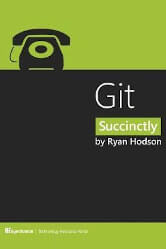Last Updated on April 27, 2023
10. Git Succinctly by Ryan Hodson
 Git Succinctly helps the reader get up and running with one of the fastest-spreading revision control systems out there.
Git Succinctly helps the reader get up and running with one of the fastest-spreading revision control systems out there.
Complete with vivid diagrams, clear code samples, and a careful walk-through of primary features, this book is a quick guide to how Git operates, what its advantages are, and how you can incorporate it into your own workflow.
Git Succinctly teaches you how to install and configure Git, how to create and clone repositories, how to use the staging area to organize and manage your commits. It also shows you how to create, manage, and merge branches as well as how to interact with remote repositories.
Chapters cover:
- Overview.
- Getting Started – a brief look at installation, configuration, initializing and cloning repositories.
- Recording Changes – introduces the basic workflow for creating snapshots using the working directory, staging area, and committed history.
- Undoing Changes – undoing in the working directory, undoing in the staging area, and an entire commit.
- Branches – manipulating branches, checking out branches, merging branches, branching workflows, and rebasing.
- Remote Repositories – covers the mechanics of remotes, and presents two common workflows of Git-based collaboration: the centralized workflow and the integrator workflow.
This book is licensed for reading only if obtained from the link below. It’s strictly for personal, educational use.
11. Learn Version Control with Git by Tobias Gunther
 Learn Version Control with Git is a step-by-step course for the complete beginner.
Learn Version Control with Git is a step-by-step course for the complete beginner.
Chapters include:
- The Basics.
- Branching & Merging.
- Sharing Work via Remote Repositories.
- Advanced Topics.
- Tools & Services.
- Appendix.
12. Version Control by Example by Eric Sink
 Version Control by Example uses practical examples to explain version control with both centralized and decentralized systems.
Version Control by Example uses practical examples to explain version control with both centralized and decentralized systems.
The book looks at 4 version control tools: Git, Apache Subversion, Mercurial, and Veracity.
The author founded SourceGear, a software company which produces version control tools.
The book covers:
- Basic version control commands and concepts.
- Introduction to Distributed Version Control Systems (DVCS).
- Advanced branching workflows.
- Strengths and weaknesses of DVCS vs. centralized tools.
- Best practices.
- How distributed version control works under the hood.
Pages in this article:
Page 1 – Pro Git and more books
Page 2 – Conversational Git and more books
Page 3 – Git from the Bottom Up and more books
Page 4 – Git Succinctly and more books
All books in this series:
| Free Programming Books | |
|---|---|
| Ada | ALGOL-like programming language, extended from Pascal and other languages |
| Agda | Dependently typed functional language based on intuitionistic Type Theory |
| Arduino | Inexpensive, flexible, open source microcontroller platform |
| Assembly | As close to writing machine code without writing in pure hexadecimal |
| Awk | Versatile language designed for pattern scanning and processing language |
| Bash | Shell and command language; popular both as a shell and a scripting language |
| BASIC | Beginner’s All-purpose Symbolic Instruction Code |
| C | General-purpose, procedural, portable, high-level language |
| C++ | General-purpose, portable, free-form, multi-paradigm language |
| C# | Combines the power and flexibility of C++ with the simplicity of Visual Basic |
| Clojure | Dialect of the Lisp programming language |
| ClojureScript | Compiler for Clojure that targets JavaScript |
| COBOL | Common Business-Oriented Language |
| CoffeeScript | Transcompiles into JavaScript inspired by Ruby, Python and Haskell |
| Coq | Dependently typed language similar to Agda, Idris, F* and others |
| Crystal | General-purpose, concurrent, multi-paradigm, object-oriented language |
| CSS | CSS (Cascading Style Sheets) specifies a web page’s appearance |
| D | General-purpose systems programming language with a C-like syntax |
| Dart | Client-optimized language for fast apps on multiple platforms |
| Dylan | Multi-paradigm language supporting functional and object-oriented coding |
| ECMAScript | Best known as the language embedded in web browsers |
| Eiffel | Object-oriented language designed by Bertrand Meyer |
| Elixir | Relatively new functional language running on the Erlang virtual machine |
| Erlang | General-purpose, concurrent, declarative, functional language |
| F# | Uses functional, imperative, and object-oriented programming methods |
| Factor | Dynamic stack-based programming language |
| Forth | Imperative stack-based programming language |
| Fortran | The first high-level language, using the first compiler |
| Go | Compiled, statically typed programming language |
| Groovy | Powerful, optionally typed and dynamic language |
| Haskell | Standardized, general-purpose, polymorphically, statically typed language |
| HTML | HyperText Markup Language |
| Icon | Wide variety of features for processing and presenting symbolic data |
| J | Array programming language based primarily on APL |
| Java | General-purpose, concurrent, class-based, object-oriented, high-level language |
| JavaScript | Interpreted, prototype-based, scripting language |
| Julia | High-level, high-performance language for technical computing |
| Kotlin | More modern version of Java |
| LabVIEW | Designed to enable domain experts to build power systems quickly |
| LaTeX | Professional document preparation system and document markup language |
| Lisp | Unique features - excellent to study programming constructs |
| Logo | Dialect of Lisp that features interactivity, modularity, extensibility |
| Lua | Designed as an embeddable scripting language |
| Markdown | Plain text formatting syntax designed to be easy-to-read and easy-to-write |
| Objective-C | Object-oriented language that adds Smalltalk-style messaging to C |
| OCaml | The main implementation of the Caml language |
| Pascal | Imperative and procedural language designed in the late 1960s |
| Perl | High-level, general-purpose, interpreted, scripting, dynamic language |
| PHP | PHP has been at the helm of the web for many years |
| PostScript | Interpreted, stack-based and Turing complete language |
| Prolog | A general purpose, declarative, logic programming language |
| PureScript | Small strongly, statically typed language compiling to JavaScript |
| Python | General-purpose, structured, powerful language |
| QML | Hierarchical declarative language for user interface layout - JSON-like syntax |
| R | De facto standard among statisticians and data analysts |
| Racket | General-purpose, object-oriented, multi-paradigm, functional language |
| Raku | Member of the Perl family of programming languages |
| Ruby | General purpose, scripting, structured, flexible, fully object-oriented language |
| Rust | Ideal for systems, embedded, and other performance critical code |
| Scala | Modern, object-functional, multi-paradigm, Java-based language |
| Scheme | A general-purpose, functional language descended from Lisp and Algol |
| Scratch | Visual programming language designed for 8-16 year-old children |
| SQL | Access and manipulate data held in a relational database management system |
| Standard ML | General-purpose functional language characterized as "Lisp with types" |
| Swift | Powerful and intuitive general-purpose programming language |
| Tcl | Dynamic language based on concepts of Lisp, C, and Unix shells |
| TeX | Markup and programming language - create professional quality typeset text |
| TypeScript | Strict syntactical superset of JavaScript adding optional static typing |
| Vala | Object-oriented language, syntactically similar to C# |
| VHDL | Hardware description language used in electronic design automation |
| VimL | Powerful scripting language of the Vim editor |
| XML | Rules for defining semantic tags describing structure ad meaning |
